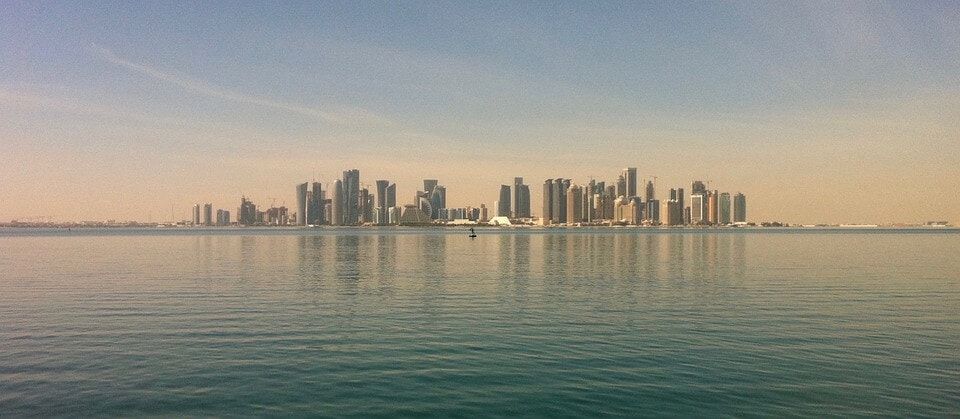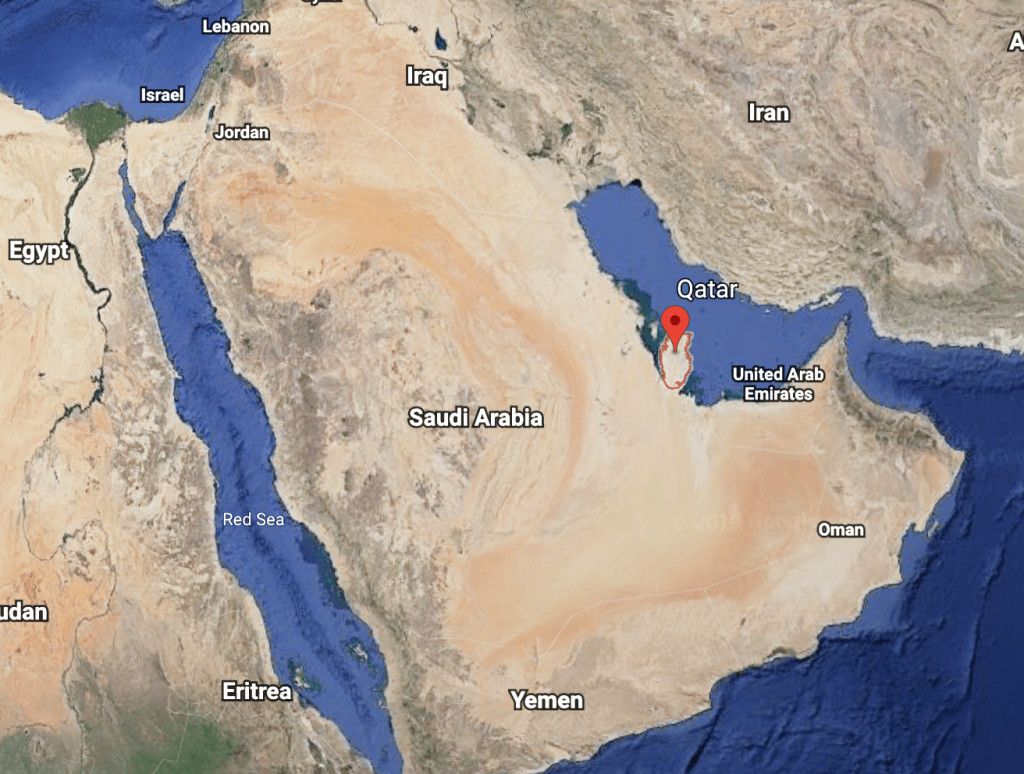On June 16, 2019, a delegation from Qatar arrived in the Gaza Strip to provide $15 million in aid to the Palestinian residents. Around 100,000 families were to receive a $100 stipend each, a small boost amid an economic crisis in the Strip. The funds are part of Qatar’s effort to help maintain a precarious ceasefire between Israel and Hamas, having provided over $800 million to Gaza since 2014. While Israeli Prime Minister Benjamin Netanyahu has permitted these funds to arrive, they symbolize the complicated background to emerging Israel-Qatar relations.
Qatar’s independent foreign policy has made it the wild card of the Middle East. Over the last few decades, Doha has both built ties with Israel and opposed them. At the same time, it has also broken with the Gulf States by backing extremist groups and strengthening relations with Iran.
Qatar’s history of flip-flopping raises important questions about its current diplomatic relationship with Israel. Besides being perceived as a neutral regional peace broker, what alternative motives does Qatar have in mediating the Israeli-Palestinian conflict? Can Israel place its full trust in this wealthy Emirate?
Join the fight for Israel’s fair coverage in the news
Qatar’s Rise to Prominence
Until Sheikh Hamad bin Khalifa Al Thani came to power in 1995, Qatar had been on the sidelines of world affairs. Once in office, Sheikh Hamad worked to transform Qatar’s economy, propelling the country into an energy superpower and a hub of finance.
Qatar, unlike other Gulf States, is also ethnically and religiously homogeneous. This helps remove opposition to the government, giving Qatari rulers more freedom to pursue their initiatives.
Sheikh Hamad capitalized on this freedom and economic growth to pursue his independent foreign policy agenda. As Qatar advanced as a major regional player, the government has navigated complex relationships and mediated conflicts, often balancing relations with competing regional powers.
The Israel Balancing Act
Israel-Qatar relations can be explained through this lens. At times, the Qatari leadership has found it beneficial to improve ties with Israel, only to reverse the progress a short time later.
Relations with Israel began to improve in 1993 following the signing of the Oslo Accords. Qatar supported progress towards coexistence between Israelis and Palestinians. Around this time, it hosted visits from Israeli officials, and Qatar’s media softened their anti-Israel stance.
Israel-Qatar relations normalized in 1996, as Israel was permitted to open a trade representative office in Doha. However, relations soured when Netanyahu was first elected prime minister. Qatar criticized Netanyahu’s policies, including the opening of the Western Wall tunnel.
Regardless, Qatar’s government maintained ties and allowed the trade office to continue functioning. In 1997, Qatar even insisted on allowing an Israeli representative to attend the Middle East and North Africa Conference in Doha.
As the only Gulf Cooperation Council (GCC) country to have normalized relations with Israel, Qatar’s stance demonstrated its bold and independent foreign policy. Qatar acknowledged the Arab countries’ disapproval, but it refused to cut ties with Jerusalem.
Just when it seemed steadfast in its support for Israel, Qatar caved to external pressure. After the Second Intifada, the Organization of the Islamic Conference (OIC) in November 2000 insisted that Qatar break relations with Israel. Both Saudi Arabia and Iran threatened to boycott the summit. In response, Qatar closed the Israeli trade office, expressing solidarity with Arab countries in their support for the Palestinians.
Below the surface, though, Israel-Qatar relations continued. Just a month after the OIC, a Qatari official and former Israeli foreign minister Shlomo Ben-Ami held a secret meeting in Geneva. A few years later, Qatari and Israeli foreign ministers met again in Paris for talks about Arab-Israeli peace. Israel also supported Qatar’s bid to become a member of the UN Security Council, a major step in Qatar’s rise as a regional peace broker.
Consequently, Qatar became the lone wolf of the Gulf, delicately balancing commitments to Israel and the Arab states. This foreign policy strategy became even trickier during the 2006 Second Lebanon War.
After Israel’s campaign in Lebanon, Qatar used its Security Council position to advocate for a quick end to the war and a withdrawal of Israeli troops behind the Blue Line. Its disapproval of Israel’s “disproportionate” intervention matched Arab nations’ sentiments. However, Qatar later diverged by calling for dialogue between Israel and Lebanon.
Around this time, Qatar added another complicated piece to its foreign policy puzzle: it began forming a relationship with Hamas and Hezbollah. At one conference in Doha in 2006, Qatar invited Israeli foreign minister Tzipi Livni, only to host Hamas leader Khaled Meshal just a few days later.
When the 2009 Gaza War broke out, Qatar spoke out against Israel, calling for an Arab summit in support of the Palestinians. Hamas members attended the summit in Doha, and Qatar broke ties with Israel.
Qatar believes it can bring peace to the Middle East through negotiation with opposing sides. However, relations with both sides in a conflict brings contradictions. Specifically for Israel, it means Qatar has flip-flopped on its support, raising important questions about Israel’s ability to trust Qatar in tough situations like the Gaza War. As Uzi Rabi, director of the Moshe Dayan Center for Middle East Studies at Tel Aviv, explains,
Maintaining relations with Israel has enabled Qatar to assert its independence in the Arab arena and compete as an emerging regional political power. By the same token, when during the Gaza War Qatar found that its relations with Israel could not be used to any advantage, Qatar went as far as to cut relations with Israel, and provide a forum for the Iranian-backed Hamas to increase its legitimacy in the inter-Arab arena.
Following the Gaza War, Qatar reversed its freeze on ties with Israel by offering a deal to renew diplomatic relations. Qatar proposed to rebuild trade relations with Israel and reopen the office in Doha in exchange for permission to provide funds to Gaza for infrastructure development. Israel refused, believing Hamas could use the money to fuel its military efforts.
However, when Netanyahu later met with Prime Minister Hamad bin Jassim to restore relations, Qatar said it would agree as long as Israel was “serious about the peace process.” Compared to other Gulf States, this was a low bar.
Supporters of Terrorism?
Since developing ties with Hamas and Hezbollah, Qatar has been deemed a major supporter of terrorism. In 2017, the Jerusalem Center for Public Affairs declared that Qatar had become the “main supporter of radical Islamic terror organizations” in the region.
While Qatar’s ties with Hezbollah are less defined, many events over the last decade highlight its support for Hamas:
- Qatar’s government invited former Hamas politburo chief Khaled Meshal to reside in Doha in 2012.
- Qatar’s foreign minister requested a complete lift of the blockade on Gaza after Operation Protective Edge in 2014 and said the Palestinians had been living in a prison since 1967.
- Qatar hasn’t reopened Israel’s trade office since fully shutting it down in 2009, a sign of its backing for Hamas.
- Qatar hosts Muslim Brotherhood leaders who fled Egypt after current president al-Sisi came to power.
- Since 2013, Qatar has been sending millions of dollars to Gaza for construction efforts, raising concerns about Hamas’s misuse of the money for military bunker upgrades, rocket launches, and other military efforts.
Moreover, Qatar and Iran revived full diplomatic ties in the summer of 2017. Because Iran has been the backbone of Hezbollah, other Arab states worried Qatar was supporting this terrorist group as well.
In response to Qatar’s suspected support for terrorism and ties with Iran, the Arab Quartet – Egypt, Saudi Arabia, the UAE, and Bahrain – blockaded the country in 2017. Known as the Qatar diplomatic crisis, these Arab nations put forward a list of 13 demands and cut all transport and diplomatic ties with Qatar.

The Current Relationship
The sanctions from the Arab states put significant pressure on Qatar. To fill the gap, the Qataris have worked to build a strong alliance with the US. That comes hand-in-hand with ties with Israel, a relationship they’ve embraced more positively following the blockade.
Israel has also opened up to Qatar, welcoming Qatari aid to Gaza. In the past, these funds angered Israel, but now the government sees the money as helpful to avoid conflict.
They’ve also kept the current relationship out of the spotlight. For example, the Qatari emissary to Gaza, Mohammed al-Emadi, and past Israel defense minster, Avigdor Liberman, met in June of 2018, but news of the meeting was not publicized until two months later.
The US is backing closer Israel-Qatar relations as well. Jason Greenblatt, US envoy to the Middle East, has stated that cooperation between Israel and Qatar could benefit the situation with Gaza. Today, the Qatari emissary has ongoing contact with the Israeli government, visiting Israel and Gaza at least once a month.
However, the Palestinian issue is still a major roadblock to formal ties with Israel. Qatari foreign minister Sheikh Mohammed bin Abdulrahman Al-Thani has expressed his support for a two state solution, pointing to the conflict as the primary reason why the two countries currently have no official diplomatic relations.
Some Concluding Thoughts…
While Israel-Qatar relations have looked more positive over the last few years, Israeli trust in Qatar’s efforts as a peace broker with the Palestinians should still be a concern. Shlomi Eldar, a columnist for Al-Monitor’s Israel Pulse, brings up an important consideration:
In other words, is this a case of honest Qatari pragmatism, or is it all part of a game so that Qatar can get a foothold in Gaza and the West Bank before it shows its true face? Opinions on all these matters are divided.
Qatari ties with Iran and Hamas, two parties that have expressed a desire to erase Israel from the map, may be red flags for where Doha’s true motives lie. This should at least incentivize Israel to tread carefully in the relationship. In addition, Qatar’s last two decades of flip-flopping on Israel makes it difficult for Israel to put its faith in the Emirate.
On the other hand, Qatari pragmatism should not be discounted. Its independent foreign policy clearly shows the aim to rise in regional influence and act as a neutral conflict mediator.
Although a lot is left up to debate, the current relationship is, for the most part, mutually beneficial. For Israel, Qatar’s funds to Gaza can help decrease instability and social unrest there as well as aid poor Palestinian residents. For Qatar, the relationship with Israel helps to promote regional independence and maintain ties with the United States, a key military and economic partnership that allows the country to navigate around the Arab Quartet blockade.
As Qatar’s aid to Gaza continues, it is evident that the state is walking a tightrope between Israel, Hamas, the Arab states, and Iran. Doha’s relationship with Israel has been on and off, resetting only when it becomes beneficial to both countries. Qatar’s current unwillingness to commit to a side makes fixed, normalized Israel-Qatar relations seem a long way off.


